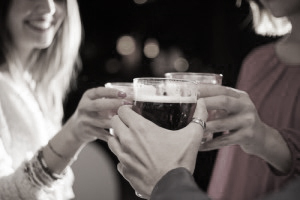 During the holiday season which begins with Thanksgiving and carries through to New Year’s Day, there are more alcohol-related fatalities in the United States than at any other time throughout the year. It is also the most dangerous time of year for those in recovery who are trying to maintain their sobriety. For those who are still addicted to alcohol, and who get behind the wheel of a vehicle the holiday season presents its own risk—both to themselves and to others driving on the highways.
During the holiday season which begins with Thanksgiving and carries through to New Year’s Day, there are more alcohol-related fatalities in the United States than at any other time throughout the year. It is also the most dangerous time of year for those in recovery who are trying to maintain their sobriety. For those who are still addicted to alcohol, and who get behind the wheel of a vehicle the holiday season presents its own risk—both to themselves and to others driving on the highways.
Alcohol and the Holidays
Alcoholic drinks are an accepted holiday tradition, and are standard fare at parties and get-togethers with friends and families. It is customary during the holiday season for many to stock-up on extra liquor and wine, and serve alcohol-spiked eggnog and specialty liqueurs.
Hard liquor, wines, and champagnes are often regarded as appropriate holiday gifts, and an appropriate contribution to a Thanksgiving or Christmas dinner get-together. Offering a guest a drink of “holiday cheer” has a long-standing place in traditional holiday celebration.
But for the alcoholic, the social acceptance and available abundance of alcoholic drinks during the holidays presents serious risks, including driving under the influence and causing untold harm to self and others. Whether it is an arrest that ends the alcoholic in jail for driving under the influence, or a fatal vehicle accident which forever changes the course of life for all whom it impacts, it is a serious and potentially life-threatening issue.
It is important to be aware of as well as be able to recognize some signs of alcoholism during the holidays. With recognition it becomes possible to intervene before disaster strikes, and to prevent unneeded hardship and sorrow for all involved.
Recognizing Signs
It very well may be that the alcoholic is the last person able to admit he or she is addicted to alcohol. Confirmed, experienced alcoholics can also be very adept at hiding their drinking—and how much and how often they are drinking– from others. Yet, there are still signs which can be observed and recognized.
Appearing to be Sober
An experienced heavy drinker who has built-up a tolerance to alcohol can appear to be sober amongst others less-accustomed to drinking. While others at a Thanksgiving holiday get-together can be seen to be “tipsy”, the alcoholic may still seem sober. Watch for the person to present an air of well-practiced “sobriety”, when he or she is in fact, not sober.
Consuming Large Amounts
Many shoppers will be stocking-up on holiday amounts of liquor, wines and champagnes. It is not unusual to see a liquor-filled shopping cart in the check-out line in preparation for the holidays, and the amount would ordinarily go unnoticed. But an alcoholic would burn through a holiday-season supply rapidly, perhaps in a couple days rather than a couple weeks. Watch for over-buying, too-frequent buying, and over consumption of what has been purchased already.
Making Holiday Excuses
An alcoholic can smuggle in bottles of booze with their bundles of holiday parcels and extra Thanksgiving grocery bags and goodies. It is easy to excuse over-buying of alcoholic beverages “because it is the holidays.” Watch for what is actually in the bags and boxes brought home after a shopping trip.
Out from Under
For those individuals who family and friends already suspect are abusing alcohol, and on whom a watchful eye is already being kept, the holidays can present the alcoholic an opportunity to “get out from under” the watchful eye of others. Extra shopping trips, a run to the grocery story, a chance meeting with an old friend home for the Thanksgiving holiday—all provide a real or manufactured “reason” to get out, and drink.
As one former alcoholic with a long history of drinking and lying about it said, the holidays afforded him the opportunity to “sneak and creep”. During the holiday season, he could sneak himself some drinking time under the guise of participating in the normal holiday-type activities.
Sober Holidays
Sober holidays take planning for those who are recovered alcoholics, and for those who are trying to help an alcoholic get through the holiday season—and into a rehabilitation treatment program.
Sharing Thanksgiving with friends and family who do not drink or use drugs is vital to maintaining sobriety. Those who are recently sober may want to spend the holiday with their sponsor or their support group, and away from any holiday festivities which invite relapse.
For those still struggling with alcoholism, there is hope. It can be overcome. Please contact www.narcononarrowhead.org for more information.